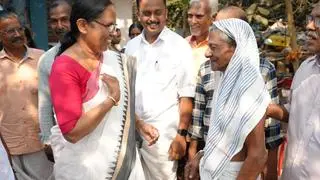Women are making gradual inroads into yet another male bastion – the legendary dabbawalas system in Mumbai. For purely economic reasons – growing pressure on household budgets following rising prices and declining wages of their husbands — about 20-25 women have now joined the over 5,000-strong army of dabbawalas.
A few years ago, there were only two-three such women, who are now referred to as ‘lunch box ladies’ by the dabbawalas.
“Most of these women right now work within the areas they live in and primarily cater to delivering dabbas (lunch boxes) in schools,” Sakharam Sitaram Gavande, the Secretary of the Mumbai Dabbawalas said, adding that they were included into the system as they were facing economic problems at home.
Values
The dabbawala representatives, who usually are seen wearing Gandhi-caps, were here to give tips to members of the Young FICCI Ladies Organisation on how to run an environment-friendly, technology-free (except for mobile phones) and successful organisation in the era of aspirations, material needs and short-lived loyalties to organisations.
“We are surviving in this era because we are very clear about our values. Our culture comes first, commercial interest later. For us, customer is God and food is religion. If we get late, food goes waste,” said Abhishek Dinkar Ekal, Vice-President of the Mumbai Dabbawalas, who deliver over 2 lakh lunch boxes across the length and breadth of the country’s financial capital.
Gavande, who has been distributing dabbas for 40 years, said even though dabbawalas earn anything between Rs 8,000 to Rs 25,000 a month, depending on the distance and weight of the lunch box, they stick around as they are part of a huge family culture that is built on “delivering food cooked with love”.
“While most of our members are Maharashtrians, some North and South Indian have also joined us,” said Ekal, adding that most of the recruitment is done by word.
That 85 per cent of dabbawalas are illiterate, yet deliver the colour-coded boxes with an error margin of ‘one in 16 million’ seems the biggest lesson in efficiency. But, when asked about the much-acclaimed film ‘Lunch Box’ based on a love story built on an error that leads to exchange of lunch boxes, the dabbawalas weren’t too happy.
“That’s just a film. The producer came to us and apologised to us after we objected,” said Ekal.






Comments
Comments have to be in English, and in full sentences. They cannot be abusive or personal. Please abide by our community guidelines for posting your comments.
We have migrated to a new commenting platform. If you are already a registered user of TheHindu Businessline and logged in, you may continue to engage with our articles. If you do not have an account please register and login to post comments. Users can access their older comments by logging into their accounts on Vuukle.